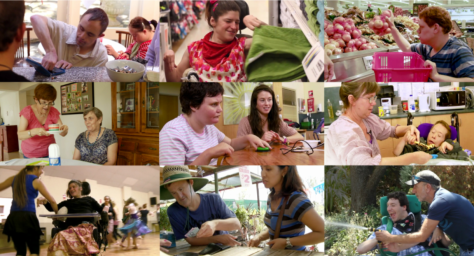
Active Support - Every Moment Has Potential
Course Overview
Every Moment Has Potential is an online learning resource developed specifically for disability support workers.
The resource provides an introduction to Person Centred Active Support - a way of working that enables everyone, no matter what their level of intellectual or physical disability, to make choices and participate in meaningful activities and social relationships.
When support workers use Person Centred Active Support, it leads to a better quality of life for the people they support. Increasingly, disability support services are adopting Person Centred Active Support as a way of working and are expecting support workers to be skilled in this approach.
This online learning resource is based on research undertaken by many researchers in the UK and Australia including the late Professor Jim Mansell and Dr Julie Beadle-Brown, Professor Christine Bigby and Dr Emma Bould.
Learning Objectives
This online learning resource introduces you to:
- the key elements of Person Centred Active Support
- the skills you need to practice Person Centred Active Support in your workplace
- some of the many positive outcomes for people with a disability that occur when support workers use Person Centred Active Support.
In order to demonstrate competency in Person Centred Active Support practice, the learning in this resource must be complemented by hands on practice in a workplace.
Qualifications Supported by this Online Learning Resource
- The five modules of Every Moment Has Potential support the CHCDIS302A Maintain an environment to empower people with disabilities unit of the CHC08 Community Services Training Package. This is a core unit of both the CHC30408 Certificate III in Disability and CHC40312 Certificate IV in Disability qualifications. These qualifications are nationally recognised as part of the CHC08 Community Services Training Package. See the Facilitator Guide for information about where the unit’s elements and performance criteria are aligned to the content in the modules.
- While this resource supports the CHCDIS302A Maintain an environment to empower people with disabilities unit, it does not include all the material you need to develop competency in this unit. For further information, please contact your Registered Training Organisation.
- In order to develop competency in the CHCDIS302A Maintain an environment to empower people with disabilities unit your practice will need to be assessed in your workplace.
How to Use this Online Learning Resource
- There are five modules in this resource. We encourage you to work through them in order.
- You can work through this resource on your own, or with the support of a facilitator or trainer in your workplace or training organisation.
- Each module includes short video talks introducing key concepts and videos of Australian examples of support workers putting Person Centred Active Support into practice.
- Words that you may not have come across before are underlined and linked to a glossary that provides a brief explanation - for example, the word engagement. Just click the light blue underlined word to see what it means. You can also see the full Glossary online, or download a pdf version in the Resources section.
- Each module includes online activities that can be completed using the downloadable workbook in the Resources section.
- The workbook also has examples to help you complete the activities in each module. You can discuss your answers with colleagues in team meetings, or if you would like some further guidance you can send an enquiry using the online Contact Form.
- Each module will take you between 30 and 60 minutes to complete.
Acknowledgements
This online learning resource was funded by the Australian Government Department of Industry. It is a collaboration between Greystanes Disability Services and the Living with Disability Research Centre at La Trobe University. It was developed with input from a wide range of stakeholders, including Western Sydney Institute of TAFE NSW and an Industry Reference Group and Steering Committee. Click here to see full credits.







